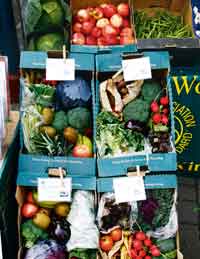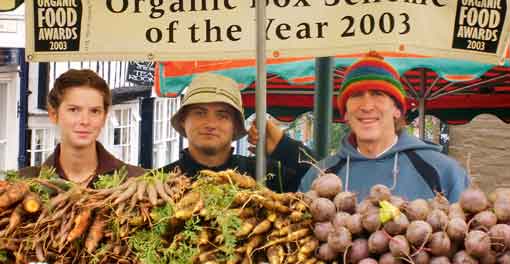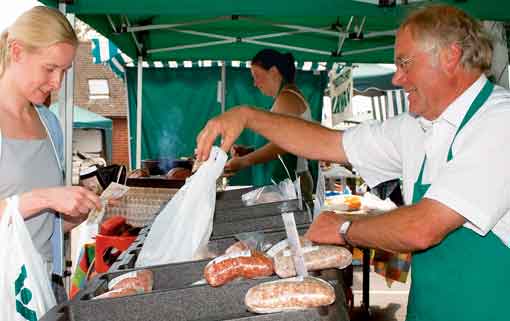Food chain: Retail expertise key to farm shop success

The most successful farm shops or farmers’ market stalls are stand-alone retail businesses, not simply an extension of the farming enterprise, according to retail “guru” Dennis Reid.
“If you always do what you’ve always done, you’ll always get what you’ve always got”, says Mr Reid, chairman of Retail Performance Specialists of New Zealand.
The most successful farmers’ market stalls capitalise on getting greater value for each transaction, and have a clear strategy of how to grow their business, he says.
For established farm retail businesses, adding value at the point of sale is vital to increase returns from each transaction. “If your customer is buying a meat joint valued at £10 and a stallholder is selling sauces and condiments to accompany that Sunday lunch, then aim to increase the average transactional value by selling the benefits and enjoyment of including £5-8-worth of sauces with the main course.”
A structured performance improvement strategy setting out exactly what farmers want to achieve will help farmers move their businesses forward over 6-18 months.
“List key performance areas of your stall or farm shop. These would probably include: Business vision, sales targets, customer attraction and retention, product range and promotion,” says Mr Reid.
“Then ask three key fundamental questions about these vital nine areas: Where am I now; Where do I want to go? And how do I make it happen?”
Once worked out and agreed, the plan should be subsequently transferred to a clear, simple and practical document. “A measure of a good strategy is that it can be easily understood by anybody not familiar with your business,” says Mr Reid.
The performance improvement strategy document should be reviewed regularly throughout the year as goals and markets change and as farmers identify what’s working, what’s not and what needs to happen to achieve the required results.
“The best ideas could well come from outside your own business and skill areas,” says Mr Reid. “You should also be open in adopting for your own market or stall ideas seen to work for others, which therefore requires monitoring your competitors.”
If you’re not representing yourself on your stall or in your farm shop, consider the importance of those meeting your customers face to face, Mr Reid says.
Research shows that staff performance coaching and mentoring can improve sales by as much as 62%. Farmers’ market staff need to became skilled in closing sales, Mr Reid says, learning how to add value while selling fast but pleasantly.
Understanding human behaviour traits, and how to improve or change an individual’s approach to farmers’ market work, are also key management inputs. “If you observe it and do not address it, you condone it,” Mr Reid says.
Direct sales get their slice of pie in the recession
Despite the recession, farms shops and farmers’ markets have seen business hold up well.
“We have slightly increased spends for our two farm retail shops and at our two farmers’ markets stalls” says Will Edmonds, Roots at Rushwick Farm Shop, Worcester.
“I now undertake more critical and frequent financial analyses of every enterprise. We are stricter about how staff dress, what they say and how they say it.” Mr Edmonds says he is exploring the potential for customer loyalty cards and how to actively engage the local community in his business.
Alan Downes, manager of Hawarden Estate Farm Shop in Flintshire, has also seen sales increase. “Turnover in our first year was in excess of £1.2m and we are experiencing a year-on-year increase of 40% as we approach our second birthday in March,” he says.
He comes to the role with 12 years management experience at ASDA. “Purchased pies were making £300 a week. After research we started making Hawarden Estate Farm Shop pies instead. Our weekly pie sales have risen to £2000,” he says.
The potential for business growth online will be key for all farm retail businesses’ performance in the next decade, with more effort needed to convince the customer of the integrity of the food they are buying.
“I foresee more emphasis on the ‘theatre’ of food, communicating the story of the brand through its provenance, how it was produced, and much more,” says Patrick Hughes, food marketing consultant at the Scottish Agricultural College.
Many businesses are beginning to think about the pros and cons of using online tools such as Twitter and Facebook, selling to farm shop customers and particularly to generate business among younger customers.
“Using video for online sales can be very powerful, but don’t let it get in the way of selling your produce,” says Rob Ward, of the Food Marketing Network.
About 70% of customers abandon their online purchases at the point of commitment, he says.
Case study
Andrew Dennis, Woodlands Farm, Kirton, Boston, Lincolnshire

Andrew Dennis (right in picture) owns and manages the 690ha mixed organic and biodynamic Woodlands Farm at Kirton. The business also has regular stalls at 14 farmers’ markets including Brigg, Grantham, Lincoln, Louth, Market Harborough and Nottingham. He was winner of the BBC Radio 4 Food & Farming Awards in 2009.
“Farmers’ Markets are ideal for promoting our box scheme business through personal contact with potential new customers,” he says.
Case study
John Emerson, Hunts Hill Farm, Normandy, Surrey

Surrey farmers’ market stallholder John Emerson has a track record any farm retailer would envy.
Every month his Hunts Hill Farm, Normandy, has stands at Milford, Petersfield, Haslemere, Wokingham, Ripley, Cobham, Guildford and Farnham markets, many on Sundays.
His 28 acres of permanent pasture produce pork, beef, chicken, lamb, duck, eggs and much more.
“We started at Petersfield farmers’ market in 1991 and employ four part-time staff including a butcher and sausage-maker.” John is chairman of Surrey Farmers’ Market Steering Group and chairman of the new Milford Farmers’ Market Co-operative.
What is FARMA?
The National Farmers’ Retail and Markets Association is a co-operative of farmers businesses involved in direct sales to the consumer through farm shops, pick-your-own farms, home delivery and box schemes, on-farm catering enterprises and farmers’ markets.
It has more than 700 members representing over 800 retail outlets across the UK.
FARMA was created in 2003 from the merger of the Farm Retail Association and the National Association of Farmers’ Markets. It is the only UK organisation dedicated to all aspects of direct farm sales.
For more information visit www.farma.org.uk
